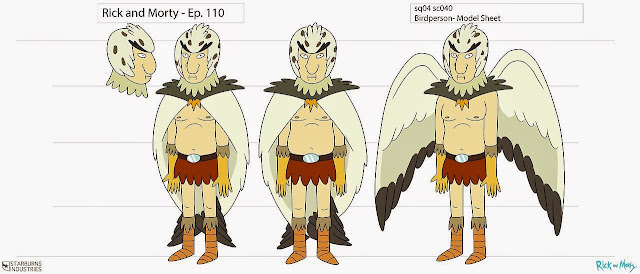Every Friday in "'Brokedown Merry-Go-Round' Show of the Week," I discuss the week's best first-run animated series episode I saw. "Brokedown Merry-Go-Round," a two-hour block of original score tracks from animated shows or movies, airs weekdays at 2pm Pacific on AFOS.
After the interdimensional mayhem of
"Close Rick-Counters of the Rick Kind," Rick and Morty chooses to go smaller-scale for its first-season finale, "Ricksy Business," by tackling that old sitcom staple of the kids in the house--in this case, Summer and the overgrown kid that is Grandpa Rick--throwing a wild house party while the parents are gone. But because this is
Rick and Morty we're talking about here, both the Smiths' house and everyone inside it wind up in another dimension during the party, after Morty accidentally activates one of Rick's experimental portal devices, and Rick sends Morty out on a dangerous mission on the alien planet to find Kalaxian crystals--not because, as Morty assumes, those crystals could act as fuel to transport everyone back to Earth, but because Rick wants to snort the crystals at the party. Spike the punch bowl with some uproarious dialogue about anti-alien slurs and bukkake--plus a bunch of horny and sometimes cannibalistic alien partiers whom Rick's befriended from his travels, including an alien feline named Squanchy (Tom Kenny), who's got fetishes for both using the word "squanch" as a verb and auto-erotic asphyxiation--and you have a house party episode that blows almost all other house party episodes of past sitcoms out of the water.
Although "Ricksy Business" is marred by the B-story about Jerry and Beth's disastrous romantic getaway at a reenactment of James Cameron's
Titanic, which is
Rick and Morty's weakest B-story since the Pluto B-story in
"Something Ricked This Way Comes," the episode earns points for building a gag out of that '80s and '90s TV cliché of a character who's neither a musician nor an actor somehow finding the time and money off-screen to record with professional studio musicians a novelty single about a dance he's named after himself. Examples include "The Urkel Dance" on
Family Matters and small-town lawyer Douglas Wambaugh in a Dracula costume singing on
Picket Fences a cover of Bobby "Boris" Pickett's "Monster Mash" called "The Wambaugh Mash." That kind of scene used to annoy the fuck out of me.
Rick and Morty is the first show I've seen that makes fun of that absurd cliché, during Rick's brief--and very "Urkel Dance"-esque--musical number, "The Rick Dance," in "Ricksy Business." Jaleel White was undeniably a great slapstick actor on
Family Matters, but I was never a fan of that show, because I preferred
The Fresh Prince of Bel-Air, plus I've always been allergic to the sappiness and catchphrase-heavy writing of Miller-Boyett sitcoms (even Bronson Pinchot knew that the writing on
Perfect Strangers was weak, so, as he said in
his A.V. Club "Random Roles" interview, he poured all his energy into Balki's slapstick to make the show more bearable for himself). As
Family Matters became more popular, it got weirder (but the joke writing never got any funnier). What was originally a bland
Perfect Strangers spinoff about the elevator operator at Balki and Larry's newspaper and her working-class family was gradually re-conceived by Miller-Boyett as a sci-fi sitcom about the family's wacky scientific genius neighbor:
Family Matters basically morphed into a proto-
Rick and Morty. So
Family Matters wound up with storylines where Urkel built sentient robots and time machines and became capable of recording pop-rap joints that would somehow spawn huge dance crazes in Chicago. I love
Rick and Morty's twisted take on "The Urkel Dance" and similar scenes from other shows: here, Rick bursts into an elaborate dance number because he's methed-up, and the explanation for the source music during his number is because it's created by an alien friend who's a boombox robot.
"Ricksy Business" marks the first time that a character sees Rick's functional alcoholism--and now, occasional enjoyment of hard drugs--for what they are: attempts to dull the pain of some sort of past trauma from either his interdimensional adventures,
his split from Beth's unseen mom or both. The character who addresses this is, oddly, neither of the Smiths. Instead, it's Rick's friend Birdperson (
Rick and Morty co-creator Dan Harmon, in another one of his vocal cameos on the show), an alien stud at the party and a Hawk (from the '80s
Buck Rogers) lookalike, who points out to Morty that in his people's native tongue, Rick's favorite catchphrase, "Wubba lubba dub dub"--which Rick's been trying to turn into another "Did I do thaaaat?"--actually means "I am in great pain. Please help me."
This is where Rick, Morty and Summer's house party storyline gets really interesting, and it's what keeps "Ricksy Business" from being a disposable and kind of empty way to close out season 1. The season has been building towards Morty's dissatisfaction with both his grandpa's behavior and his treatment of him as a human shield, ever since that final scene in
"Rick Potion #9," where Morty's shock and remorse over burying his own body was juxtaposed with Rick's boozy jadedness and affectless demeanor. Birdperson takes notice of Morty's growing discontent, especially after Rick's antics at the party, and basically tells Morty, "Maybe you should quit having adventures with Rick. The decision's all up to you."
But Morty changes his mind about further distancing himself from his grandpa when he's reminded why he used to like Rick in the first place. Rick activates another one of his ingenious inventions, a device that can stop time, so that he and his grandkids can have more time to clean up and repair the house before a returning Jerry and Beth step inside, and the previously contentious trio ends up
bonding over paint fights, covering Jerry and Beth's heads in pumpkins, pantsing the frozen townspeople, stealing a flatscreen from an electronics store and bashing
Titanic while watching it on the stolen flatscreen. Morty notices that Rick isn't saying "Wubba lubba dub dub" anymore, and he explains that it's because he has a new catchphrase--"I love my grandkids"--but before things can get further sappy, Rick reverts to his usual jerky self, shrugs off "I love my grandkids" as bullshit and kills the huggy mood by bumping one of the tunes from the party playlist, Splack Pack's 1993 Miami bass hit "Shake That Ass Bitch." This is the happiest we've ever seen Rick, Morty and Summer together, and I like how their
"shit yeah, Joffrey is dead!"-level happiness arises from
Bart-and-Milhouse-style pranks on the town, criminal acts and Miami bass.
It's too bad the B-story isn't as solid, funny or even deep as Rick, Morty and Summer's A-story because I prefer my
Rick and Morty subplots to not remind me of
Too Close for Comfort's infamous
"hey, Monroe got raped, ah-hyuck!" episode. We learn that one of pathetic Jerry's favorite movies is
Titanic--no surprise there--so he totally fangirls over the reenactment of scenes from the movie (unlikely male fandom surrounding a franchise that's marketed to females was better handled this week in
the Bob's Burgers episode about bronies). Beth thinks the whole vacation is stupid and prefers to spend all her weekend time reading in their room, so she gets a dowdy Mexican maid, who's far more enthusiastic about reenacting
Titanic, to be Jerry's companion while she avoids the weekend's activities. But the maid turns out to be crazy and rapey when she forces Jerry at gunpoint to paint her nude and reenact the film's backseat sex scene, and Beth rescues him in the nick of time, right when the naked maid forces him to drop his pants.
When Morty was nearly raped in
"Meeseeks and Destroy," there was some weight to the ordeal, and it advanced both Morty and Rick's characters and planted the seed for Morty's discontent. But when Jerry's nearly raped in "Ricksy Business," the situation doesn't add anything substantial to Jerry and Beth's characters (other than containing the season's second moment with Jerry where he implies that he was molested as a kid). It's as empty and pointless as, well, the Monroe rape episode. However, the B-story isn't completely devoid of funny moments. Actual guided tours of the locations from chick flicks like
Somewhere in Time and
Twilight are worthy of a sendup, and exaggerating those vacations to the point where even a blockbuster like
Titanic receives the couples' getaway treatment is a great way to poke fun at those vacations. The best part of the B-story is when the iceberg collision is beset by technical difficulties and interrupted by dining schedule PA announcements ("Iceberg, right ahead! The buffet is now closed. Iceberg, right ahead! The buffet is now closed.").
Even when a
Rick and Morty subplot doesn't quite fire on all cylinders, the show somehow remains stronger than most other sitcoms, animated or live-action. This was a superb first season for
Rick and Morty, a
Doctor Who parody in
Back to the Future clothing that, thanks to Justin Roiland, Dan Harmon and their crew, evolved into something greater, a richly written and darkly funny show about sociopathic behavior, in whatever dimension Morty finds himself.
Other memorable quotes:
* Summer: "What do you mean you're having a party? Are some Glip Glops from the Third Dimension going to come over and play cards or something?" Rick: "'Glip Glop'? You're lucky a Traflorkian doesn't hear you say that." Summer: "Is that like their N-word?" Rick: "It's like the N-word and the C-word had a baby and it was raised by all the bad words for Jews."
* "I love watching bukkake. I mean, like, I don't know if I personally would ever do it..." Former
Degrassi star
Cassie Steele was listed in the episode's guest voice cast. That's definitely her as Tammy, further tarnishing her
Degrassi persona with her
Rick and Morty character's enjoyment of bukkake.
* "Brad is here! Quick, make my hair look drunk."
* "Yo! Whattup, my Glip Glops?!"
* "Tammy, I should let you know I just got out of a highly intense soul bond with my previous spirit mate."
* "Prepare to be emancipated from your own inferior genes!" The familiar pipes of former
Futurama voice actor Maurice LaMarche turned Abradolph Lincoler, a failed creation of Rick's who has the DNA of both Lincoln and Hitler, into a character I'd like to see reappear, though I doubt he'll ever find a way to escape from the giant testicle monsters while they circle-jerk each other with the live human flesh of Lincoler and a few other unlucky partiers.
* "That's the end of season 1! That's the end, motherfucker! 'I don't give a fuck' is my new catchphrase! Fuck you! That's season 1! Boom! Season 1 up in your face, motherfucker!"
























